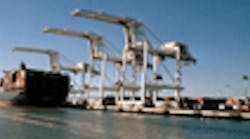The U.S. Court of Appeals for the Ninth Circuit has sided with the American Trucking Assns. (ATA) in its lawsuit against the Ports of Los Angeles and Long Beach, recommending that the District Court judge grant ATA an injunction against all or part of the ports’ Concession Plans.
According to the court, one of the provisions of the program that will probably be overturned is the Port of Los Angeles’ “disruptive” concession agreement, which “is likely to cause the most harm regardless of which choice a motor carrier makes.” Under the plan, carriers could either sign the agreement and suffer economic damage by being forced to buy new vehicles, or not sign and leave the port.
In addition, Los Angeles’ independent contractor phase-out provision, which will ban owner-operators from the port, is also likely to be overturned, the court said. The port contended that owner-operators presented “serious and longstanding safety problems” while using company drivers enabled giving “control to the concessionaires as employers of their employee drivers to a degree not possible with casual or independent drivers.” Long Beach’s Concession plan does not have an owner-operator provision.
The U.S. Court of Appeals for the Ninth Circuit has sided with the American Trucking Assns. (ATA) in its lawsuit against the Ports of Los Angeles and Long Beach, recommending that the District Court judge grant ATA an injunction against all or part of the ports’ Concession Plans.
According to the court, one of the provisions of the program that will probably be overturned is the Port of Los Angeles’ “disruptive” concession agreement, which “is likely to cause the most harm regardless of which choice a motor carrier makes.” Under the plan, carriers could either sign the agreement and suffer economic damage by being forced to buy new vehicles, or not sign and leave the port.
In addition, Los Angeles’ independent contractor phase-out provision, which will ban owner-operators from the port, is also likely to be overturned, the court said. The port contended that owner-operators presented “serious and longstanding safety problems” while using company drivers enabled giving “control to the concessionaires as employers of their employee drivers to a degree not possible with casual or independent drivers.” Long Beach’s Concession plan does not have an owner-operator provision.
The Court of Appeals said the ports’ primary concern in implementing the plan was increasing efficiency and regulating the drayage model, as switching to an employee-based system “is the easiest model to administer” because of the “administrative cost of maintaining up-to-date records.”
ATA did not challenge the ports’ Clean Truck Program, which bans older vehicles while enacting a container fee to subsidize the purchase of newer, more environmentally-friendly trucks.
“We are extremely pleased with the decision,” said Robert Digges Jr., ATA vp & chief counsel. “The Judges understood that most of the elements of the Plans are not about safety, but rather are a regulatory effort by the Ports to create what they believe would be a more efficient drayage system.
“The Court clearly understood the plight of the motor carriers and the no-win situation that the Concession Plans present them; refuse to comply and lose their customers and possibly their businesses or comply and bear the costs of totally restructuring their business model,” Digges added.
The ports noted that the bulk of the program remains intact. “The City of Los Angeles is pleased that the centerpiece components of the Clean Truck Program that are currently in effect -- i.e., the dirty truck ban and clean truck fee -- remain intact for the benefit of thousands of Southern Californians,” the Port of Los Angeles said in a statement.
"The decision today does not change the legal status of our Clean Trucks Program or any other requirements currently in effect at the Port," said Richard D. Steinke, executive director of the Port of Long Beach. "The Port will continue to study the decision and appropriate next steps of the Court of Appeals, and anticipates that further proceedings will be held promptly before the District Court."
“Our Clean Truck Program is reducing toxic port truck pollution at an accelerated pace, and today’s ruling by the Ninth Circuit Court of Appeals does not challenge the truck ban schedule or truck fees that are helping us successfully battle this health crisis,” said Los Angeles Mayor Antonio Villaraigosa. “We are committed to fighting this case because our Clean Truck Program is the most sustainable plan for ensuring a clean, safe and secure trucking system for the long haul at the Port of Los Angeles.”



